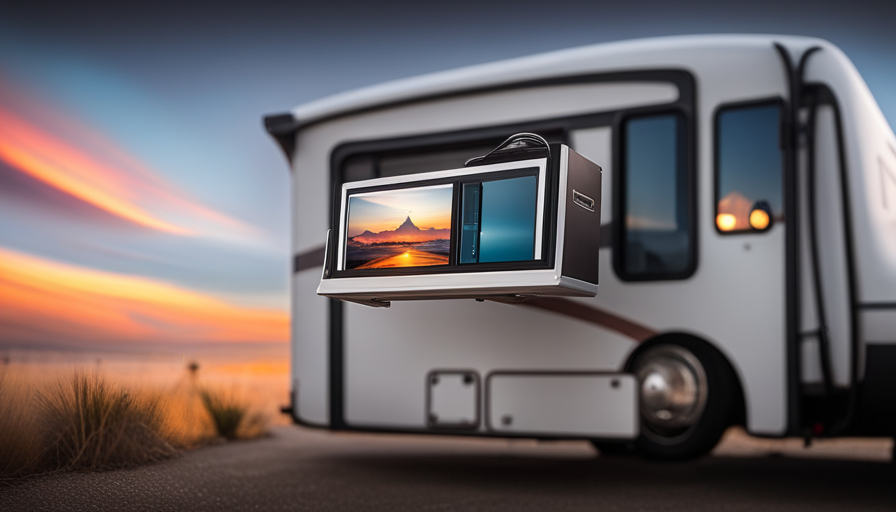I’ve frequently pondered how to secure a title for a camper that lacks one. This situation is a frequent challenge encountered by numerous camper owners, and identifying a pathway to resolution can prove to be quite difficult. Nevertheless, through thorough investigation and consultation with professionals, I’ve uncovered a detailed guide designed to assist in maneuvering through this task.
In this article, I will share with you the most efficient and reliable methods to obtain a title for your camper. From researching your state’s requirements to contacting the Department of Motor Vehicles (DMV) and applying for a bonded title, I will guide you through each necessary step.
Additionally, I will provide insight on seeking legal assistance, filing a lost title application, paying the required fees, and staying persistent throughout the process.
By following this comprehensive guide, you can ensure that you obtain a title for your camper and enjoy your travels with peace of mind. So, let’s dive in and explore the world of camper title acquisition together.
Key Takeaways
- Research state’s requirements for camper title transfer process
- Gather necessary documentation such as bill of sale, affidavit of ownership, or certificate of origin
- Consider alternative title options such as bonded title or court-ordered title
- Seek legal assistance if overwhelmed or unsure about legal complexities
Research Your State’s Requirements
So, before you start brainstorming cool names for your camper, you’ll want to do a little digging to find out what your state requires for getting a title. Understanding the title transfer process is crucial in this situation.
Each state has its own set of rules and regulations regarding titling campers, so it’s important to familiarize yourself with these requirements. This will help ensure a smooth and hassle-free process.
To begin, research your state’s Department of Motor Vehicles (DMV) website. They’ll provide you with detailed information on the steps you need to take to obtain a title for your camper. Typically, you’ll need to fill out an application, provide proof of ownership, and pay a fee. Additionally, some states may require a vehicle identification number (VIN) inspection or a safety inspection before issuing a title.
If you find that your camper doesn’t meet the requirements for a title, don’t worry. There may be alternative solutions available. Some states offer options such as bonded titles or abandoned vehicle titles for situations where the camper’s title is missing or unavailable.
Once you have a clear understanding of your state’s requirements, you can gather the necessary documentation and proceed with the title transfer process seamlessly.
Gather Necessary Documentation
First, gather all the required documents needed to secure the rightful ownership of your cherished camper. To find missing paperwork, start by searching through your personal records, such as previous bills of sale, registration documents, or insurance papers.
If you are unable to locate these documents, you may need to contact the previous owner or the dealership where you purchased the camper to request copies or any additional information they may have. It’s also recommended to check with your state’s Department of Motor Vehicles (DMV) for specific requirements and any additional paperwork that may be needed.
Proof of ownership is crucial when obtaining a title for a camper without one. Some common documents that may be required include a bill of sale, a notarized affidavit of ownership, or a certificate of origin. Additionally, you may need to provide a VIN inspection, which can be done by a certified mechanic or a representative from the DMV.
By gathering all the necessary documentation, you can ensure a smooth process in obtaining a title for your camper. Once you have all the required paperwork, you can proceed to the next step of contacting the Department of Motor Vehicles (DMV) to begin the application process.
Contact the Department of Motor Vehicles (DMV)
When you’re ready, reach out to your local DMV and embark on the journey to claim your camper’s rightful identity. Start by researching state guidelines on how to obtain a title for a camper without one.
Each state may have specific requirements, so it’s essential to gather all the necessary information before proceeding.
Contacting the DMV is crucial because they have the expertise and resources to guide you through the process. They can provide you with the specific forms and documentation needed to move forward. Additionally, they can answer any questions you may have and ensure that you’re following the correct procedures.
During your conversation with the DMV, inquire about alternative title options that may be available for a camper without a title. Some states offer options such as a bonded title or a court-ordered title. Understanding these alternatives can help you make an informed decision based on your unique situation.
With the research and information obtained from the DMV, you can now apply for a bonded title, which we’ll discuss in the next section. This process ensures that you can legally register and use your camper while protecting the rights of previous owners.
Apply for a Bonded Title
Once you’ve gathered all the necessary information from the DMV, it’s time to apply for a bonded title, ensuring that you can legally register and enjoy your camper.
Applying for a bonded title is a viable solution for obtaining a title for a camper that doesn’t have one. Here are three important things to consider when applying for a bonded title:
-
Financial Security: Applying for a bonded title requires purchasing a surety bond from a reputable insurance company. This bond serves as a financial guarantee to protect any potential owners or lienholders of the camper. It provides reassurance that there are no existing claims or liens against the vehicle.
-
Documentation: To apply for a bonded title, you will need to provide the DMV with specific documentation, such as a bill of sale, proof of ownership, and any supporting evidence that demonstrates your right to the vehicle. Make sure to gather all the necessary paperwork to avoid any delays or complications during the application process.
-
Timeframe: The duration of obtaining a bonded title can vary depending on your state’s regulations and the efficiency of the DMV. It’s important to be patient and allow sufficient time for the process to be completed.
Applying for a bonded title is just one of the alternative title solutions available. However, if you find this process overwhelming or encounter any legal complexities, it may be beneficial to seek legal assistance.
Seek Legal Assistance
If you’re feeling overwhelmed or unsure about the legal complexities involved in obtaining the necessary paperwork for your camper, seeking legal assistance is like having a knowledgeable guide to navigate the process with ease. A lawyer specializing in vehicle title issues can provide you with valuable advice and help you understand the steps involved in getting a title for your camper. They can also assist you in exploring alternative options if a bonded title is not feasible or if you encounter any roadblocks along the way.
To highlight the importance of seeking legal advice when dealing with title issues, consider the following table:
| Benefits of Seeking Legal Assistance |
|---|
| Expert knowledge and guidance |
| Streamlined process |
| Peace of mind |
By seeking legal assistance, you can tap into the expertise of professionals who have dealt with similar situations before. They can provide you with the necessary information and help you avoid any legal pitfalls that could further delay the title acquisition process. Additionally, their guidance can help streamline the overall process, saving you time and effort. This way, you can have peace of mind knowing that you are taking the right steps to resolve your camper’s title issue.
In the next section, we will discuss how to complete a vehicle inspection as part of the title acquisition process.
Complete a Vehicle Inspection
Completing a vehicle inspection is an essential step in the process of acquiring a title for your camper, as it ensures that the vehicle meets all necessary safety and emissions requirements. To ensure a smooth inspection process, it’s advisable to obtain professional help and consult with a mechanic who specializes in campers or recreational vehicles.
Here are four key aspects to consider during the vehicle inspection:
-
Safety Features: The mechanic will check if your camper has all the required safety features, such as functioning seat belts, properly working brakes, and functional lights. They’ll also inspect the tires for proper tread depth and inflation.
-
Emissions Compliance: The mechanic will evaluate the camper’s emissions system to ensure it meets the necessary environmental standards. This may involve checking the exhaust system, catalytic converter, and emission control devices.
-
Structural Integrity: The mechanic will assess the overall structural integrity of the camper, ensuring that there are no major damages or safety hazards. They’ll inspect the body, frame, and chassis for any signs of corrosion, cracks, or other structural issues.
-
Mechanical Condition: The mechanic will inspect the engine, transmission, suspension, and other mechanical components to ensure they’re in good working order. They may also conduct a test drive to assess the camper’s performance on the road.
Completing a thorough vehicle inspection will provide you with the necessary documentation and peace of mind when filing a lost title application for your camper. In the next section, we’ll discuss the steps involved in filing a lost title application.
File a Lost Title Application
Filing a lost title application is a crucial step in regaining legal ownership of your beloved camper. When your camper doesn’t have a title, it can be quite challenging to prove ownership and sell or transfer it.
To rectify this situation, you need to file a lost title application with your local Department of Motor Vehicles (DMV) or equivalent authority.
To file a lost title application, you’ll typically need to provide certain documentation, such as a bill of sale, proof of insurance, and identification. Additionally, you may need to complete a specific form provided by the DMV, stating the reasons for the lost title and providing any relevant details about the camper.
Once you have gathered all the necessary documentation, you can submit your lost title application to the DMV. It’s essential to follow any specific instructions provided by your local authority to ensure a smooth process.
After submitting the application, you may need to wait for a certain period while the DMV reviews your request and verifies the information provided.
Filing a lost title application is the first step in the process of getting a new title for your camper. Once the application is approved, you’ll need to pay the required fees to complete the process and obtain the new title.
Pay the Required Fees
To move forward in the process, you’ll need to take care of paying the necessary fees. Here are the steps you need to follow:
-
Research alternative options: Before paying the fees, it’s always a good idea to explore any alternative options that might be available to you. For example, some states offer a bonded title process where you can obtain a title for a vehicle without going through the traditional methods.
-
Determine the required fees: Each state has its own fee structure for obtaining a title for a camper. You can usually find this information on your state’s Department of Motor Vehicles (DMV) website or by contacting them directly. Make sure to gather all the necessary information to avoid any surprises.
-
Gather the required documents: In addition to the fees, you will likely need to provide certain documents to complete the title application process. These may include a bill of sale, proof of ownership, and any other supporting documentation required by your state.
-
Be prepared for potential challenges: Sometimes, unexpected challenges may arise during the title application process. It’s important to be prepared for these and have a backup plan in case things don’t go as smoothly as expected.
By paying the required fees and following the steps outlined above, you’ll be one step closer to obtaining a title for your camper. However, it’s important to stay persistent and follow up to ensure the process is completed successfully.
Follow Up and Stay Persistent
Stay on top of the process and keep following up with the necessary parties to ensure that you’re making progress towards obtaining the title for your camper. Overcoming obstacles and staying motivated are key to successfully navigating through this process.
It’s important to understand that obtaining a title for a camper without one can be a complex and time-consuming task, but with persistence, it can be achieved.
First, make a list of all the parties involved in the title transfer process. This may include the seller, the Department of Motor Vehicles (DMV), and any lienholders. Contact each party to gather the necessary information and documents required to move forward. Be prepared to provide proof of ownership, bill of sale, and any other relevant paperwork.
Next, stay organized and keep a record of all your communication. Follow up regularly with each party to ensure that they are taking the necessary steps to assist you. Be polite yet persistent in your inquiries, emphasizing the importance of obtaining the title for your camper.
In addition, it’s essential to stay motivated throughout this process. Recognize that there may be setbacks and delays, but don’t let these discourage you. Stay focused on your goal and keep pushing forward. Remember, every small step you take brings you closer to enjoying your camper with peace of mind.
Transitioning into the next section, once you have successfully obtained the title for your camper, you can finally enjoy your new adventure with peace of mind.
Enjoy Your Camper with Peace of Mind
Once you’ve successfully obtained the title for your camper, you can finally embark on your new adventure and fully enjoy the peace of mind that comes with it.
One important aspect of owning a camper is making sure you have the right RV insurance in place. RV insurance provides coverage for accidents, theft, and damages that may occur during your travels. It’s essential to have this protection to ensure that you can enjoy your camper without worrying about unexpected expenses.
In addition to having insurance, it’s crucial to keep up with regular maintenance for your camper. This will help you prevent any potential issues and ensure that your camper is always in good working condition. Some maintenance tips include checking the tires regularly for wear and proper inflation, inspecting the roof for any leaks or damage, and keeping the exterior clean and well-maintained.
Furthermore, it’s advisable to create a maintenance schedule and stick to it. This will help you stay organized and ensure that you don’t overlook any essential tasks. Regular maintenance will not only prolong the lifespan of your camper but also contribute to a smooth and enjoyable camping experience.
Obtaining the title for your camper is a significant milestone, allowing you to fully enjoy your adventures with peace of mind. By having the right RV insurance and following proper maintenance tips, you can ensure that your camper remains in excellent condition, providing you with many memorable trips ahead.
Frequently Asked Questions
Can I apply for a bonded title if I have a lien on the camper?
Getting a bonded title when there’s a lien on your camper is like navigating a winding road with some obstacles along the way. However, you can still achieve the expedited process for obtaining a camper title. It’s important to follow the necessary steps, such as providing documentation of the lien, completing an application, and paying the required fees. With the right knowledge and efficiency, you can successfully apply for a bonded title and obtain the title for your camper.
How long does it typically take to receive a bonded title?
Typically, it takes several weeks to receive a bonded title. The process involves filing the necessary paperwork, paying fees, and providing evidence of ownership, such as a bill of sale or affidavit of ownership.
However, if you have a lien on the camper, applying for a bonded title may not be an option. In such cases, alternative methods for obtaining a title could include contacting the previous owner, applying for a lost title, or seeking legal advice.
Are there any specific requirements for the vehicle inspection?
When it comes to the vehicle inspection, there are indeed specific requirements that need to be met. The documentation process plays a crucial role in this regard. It’s like the foundation of a sturdy structure, ensuring that everything is in order before the inspection takes place.
From providing proof of ownership to submitting necessary forms and fees, following the specific requirements is essential to successfully complete the inspection and obtain a title.
Can I still apply for a lost title if I don’t have any documentation for the camper?
To obtain a title for a camper without proof of ownership, you can still apply for a lost title. However, it may be more challenging without any documentation.
The process typically involves contacting your local Department of Motor Vehicles (DMV) and providing any information or evidence you have regarding the camper’s history. This could include previous registration records, bills of sale, or affidavits from previous owners.
The DMV will review your case and determine if they can issue a new title in your name.
Is it possible to expedite the process of obtaining a title for a camper?
To expedite the process of obtaining a title for a camper, there are alternative options available.
One option is to apply for a bonded title, which requires purchasing a surety bond and going through a legal process.
Another option is to contact a title service company that specializes in helping individuals obtain titles for vehicles without proper documentation. They can guide you through the necessary steps and provide assistance in expediting the process.
What Is the Average Weight of a Camper Without a Title?
The average popup camper weight without a title can vary depending on the model and size. Generally, a lightweight popup camper can weigh around 1,000 to 2,500 pounds, while larger and more feature-packed models can range from 2,500 to 4,500 pounds. It’s advisable to check the specific weight requirements for a camper before purchasing or towing it.
Conclusion
In conclusion, obtaining a title for a camper without one can be a challenging journey, much like embarking on a treacherous quest for a hidden treasure. Armed with the knowledge of your state’s requirements and the necessary documentation, you must navigate the labyrinthine corridors of the Department of Motor Vehicles.
Along the way, you may need to seek the guidance of legal experts and apply for a bonded title, akin to forging a powerful artifact. With persistence and determination, you can emerge victorious and enjoy your camper, knowing that you have conquered the bureaucratic obstacles with unwavering resolve.










